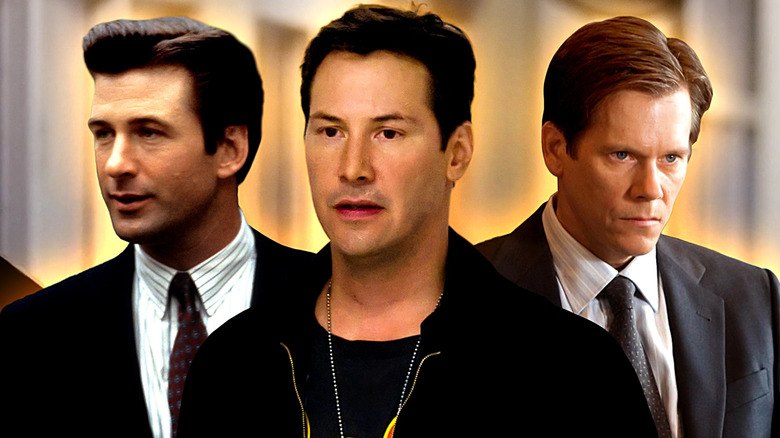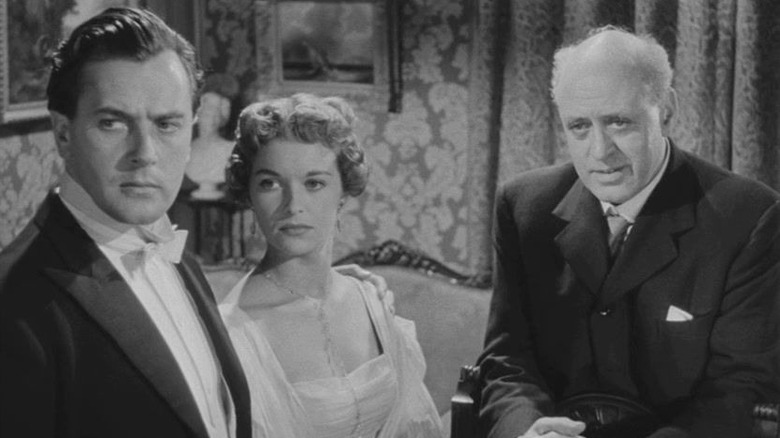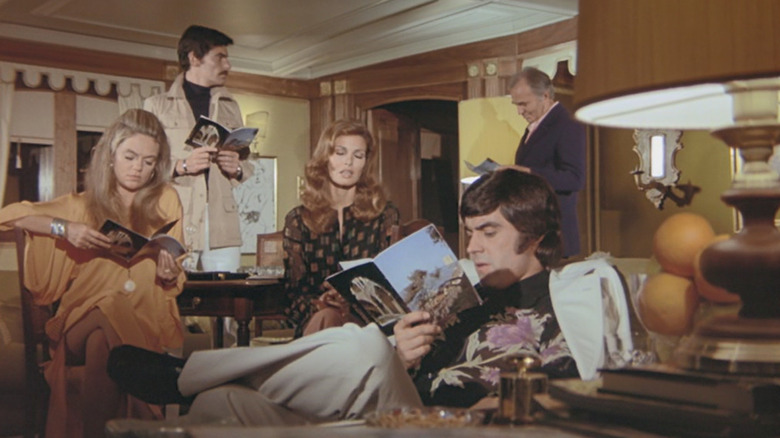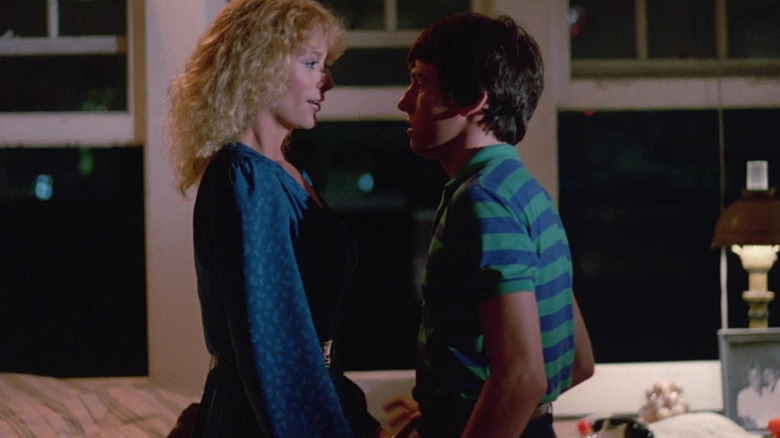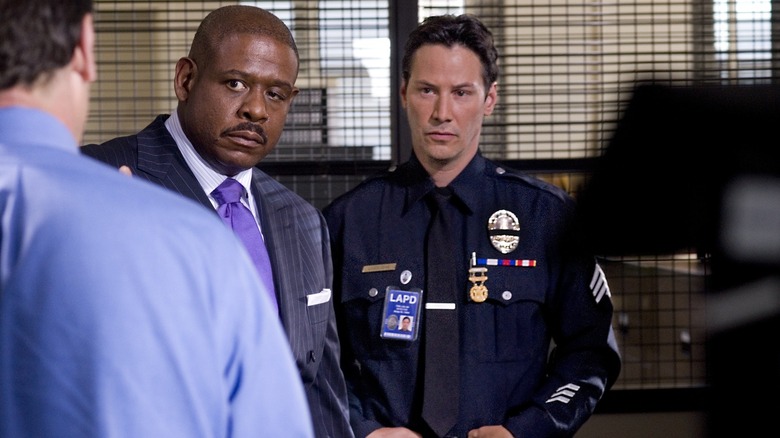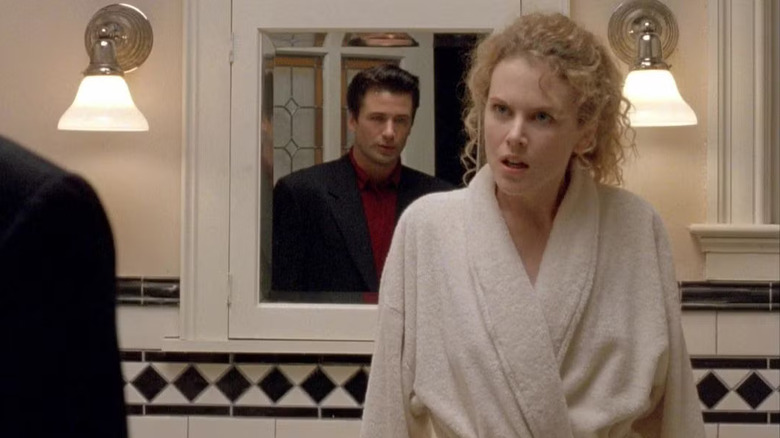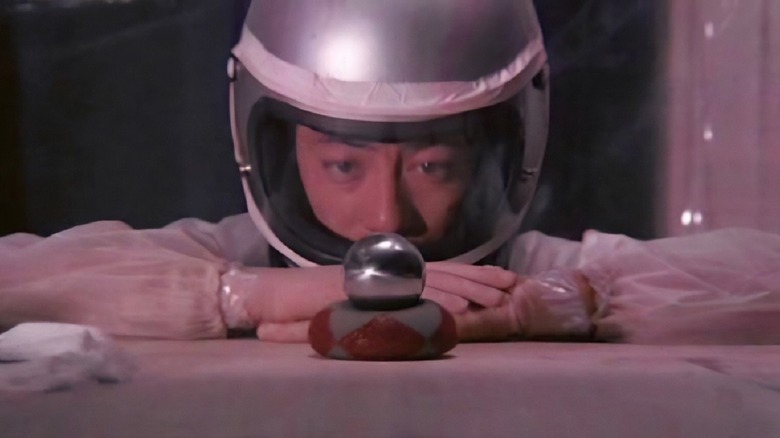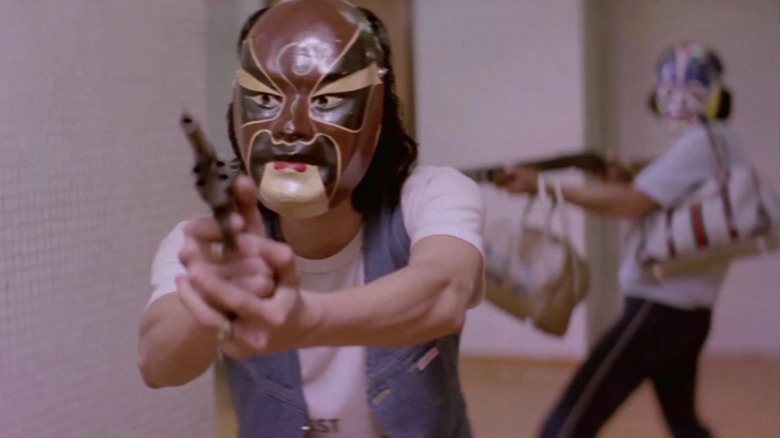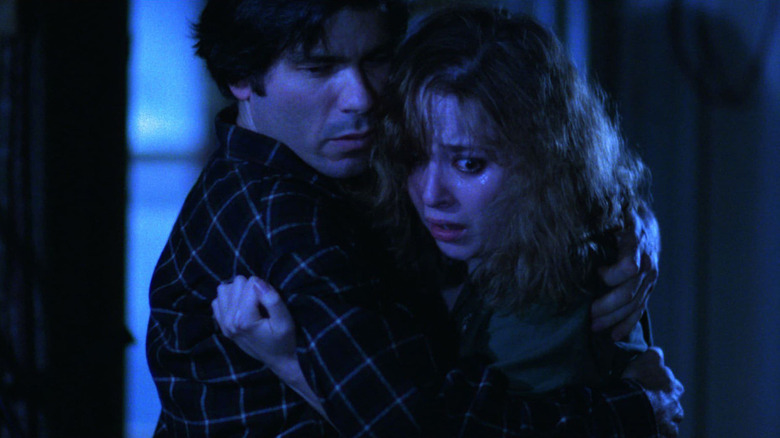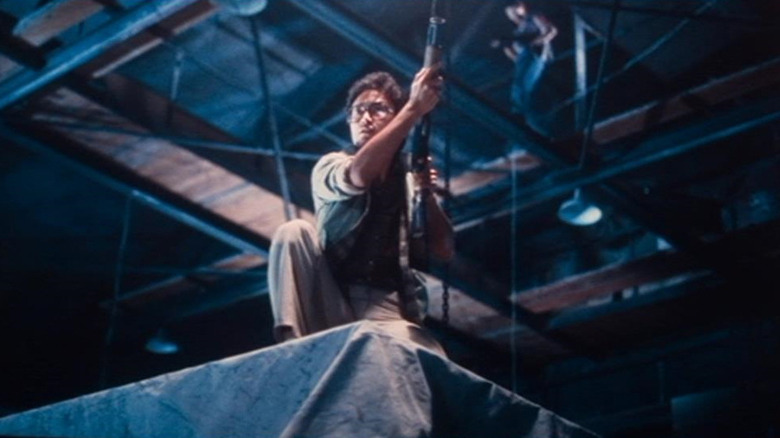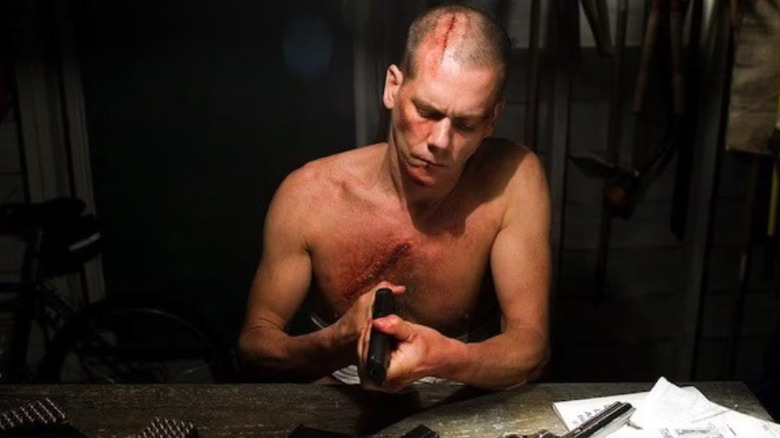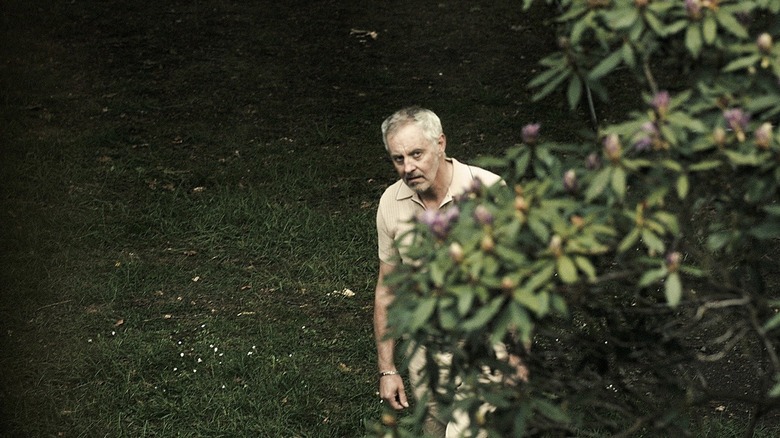The 12 Most Underrated Crime Thriller Movies
The term "underrated" can be a bit nebulous in its definition, and that's especially the case when referring to art forms like films. Some people might say it refers to movies that received lukewarm responses from audiences despite deserving far more love. Others could suggest the term applies to great movies that not enough people have seen or even heard about. For our purposes here, we're going to take a little from column A and a little from column B to create something of a primer on great, underrated crime thrillers.
Of course, that leads us to having to define what exactly counts as a crime thriller. At its most basic (and obvious), a crime thriller — a subset of the much larger thriller genre of which there are plenty of exquisite examples — is an emotionally propulsive story with a criminal act at its center. Audiences are witness to both the villains who've committed the heinous act(s) and the hero (good Samaritan, detective, past victim) trying to find justice and prevent any further carnage. Mystery can play a part, but it's far from necessary. Like most subgenres, the crime thriller can run the gamut of intensity and tone, so out of respect for that truth, the list below unfolds in a very specific order.
Below are 12 fantastic but underrated, crime thrillers, starting with some light and breezy fare, continuing on with some more serious and visceral thrills, and then wrapping up with a handful of crime thrillers that punch you in the gut so hard that your heart might just stop. Enjoy.
An Inspector Calls
A wealthy family sits down for dinner to celebrate their youngest's engagement, but their toasts and banter are interrupted by the arrival of a policeman. It seems a young woman has been found dead after drinking poison, and the inspector has some questions. "You seem to forget that we're respectable citizens and not criminals," says the young suitor. "Well, sometimes there isn't as much difference as one would think," replies the inspector, adding "indeed, if it were left to me, I wouldn't know where to draw the line." The film's approach to class distinctions, part investigation and part condemnation, serves as the backbone of this brilliant thriller set in the buildup to World War I.
Genre can be amorphous, so while "An Inspector Calls" would be equally deserving on a spot of the greatest film mysteries, its premise and plot make it a contender as one of the great crime thrillers too. It's easily the title here with the least amount of visceral, physical thrills, but it's both mentally and emotionally charged as the inspector moves through the family, one by one. It's a mystery with a tight, satisfying conclusion, but the journey there is a caustic (for 1954, anyway) critique of our inhumanity towards each other. Through it all, Alastair Sim earns both smiles and fist bumps as he targets the guilty.
The Last of Sheila
Fans of fast and funny mysteries have been well-served over the years with everything from 1976's "Murder by Death" to 1998's "Zero Effect," and Rian Johnson has recently cornered the market with his ongoing "Knives Out" franchise. Ask Johnson, though, and he'll be happy to tell you that one of his biggest inspirations was 1973's "The Last of Sheila." One year after losing his wife to a hit and run driver, a man invites some of his closest friends for a cruise on his yacht. They think it's a vacation, but he's on the hunt for a murderer. It's a fantastic setup chased by an exquisitely sharp and fun execution.
The script comes courtesy of Stephen Sondheim (yes, that Sondheim) and Anthony Perkins (yes, that Perkins), and their words find pitch-perfect performers in Richard Benjamin, Dyan Cannon, James Coburn, Joan Hackett, James Mason, Ian McShane, and Raquel Welch. It's a very fun time that grows increasingly darker as secrets are revealed and the truth comes clear, and not all of them will be returning home alive. The film is a blackly comic gem and very much a product of its time — you'll know exactly what I'm referring to when you hear it — and it finds entertaining thrills both out to sea and back again.
They're Playing with Fire
At the risk of having my film critic membership credentials revoked, 1984's "They're Playing with Fire" earns a spot on this list as a terrific little crime thriller that's also a bonkers giallo and a 1980s sex comedy. I swear I'm not making this up. Squares will tell you that it's a dumb B-movie at best, but real ones know it earns an A-grade in chemistry as it blends those seemingly disparate elements into something that bubbles over with goofy fun played deadly serious. It's well-acted, looks good, and it's charming in its sincerity even as brushes up against the ridiculous.
Sybil Danning plays a college professor who seduces one of her students before asking him to do a simple task. It turns out to be a little more complicated, though. Soon bodies are hitting the floor, blackmail becomes the word of the day, and our poor protagonist is forced to sleep his way to the truth. He's also shot at, chased, and threatened by an unseen killer, all of which bring energetic genre thrills enroute to the truth. Again, it's all played serious, but the entertainment is intentional through its numerous twists and turns (both in and out of bed).
Street Kings
David Ayer received a wave of good will from genre fans after his Jason Statham-led "The Beekeeper" crushed the box-office, and the duo reunited for the more generic "A Working Man." His filmography until then, though, has seen some wild swings in audience appreciation from the highs of "Fury" to the lows of "The Tax Collector." Right in the middle of it sits a highly underrated crime thriller — my personal favorite Ayer film — 2008's "Street Kings." Keanu Reeves stars as a brash Los Angeles detective set up for the murder of a fellow cop, but he's not going down without a fight.
A familiar enough setup, perhaps, but the script co-written by James Ellroy and Kurt Wimmer finds some quotable lines and exciting set-pieces as we follow our antihero's search for the truth. Foot chases and shootouts bring the heat, as does a strong supporting cast including the likes of Chris Evans, Forest Whitaker, Hugh Laurie, and Naomie Harris, and Reeves' very specific acting style fits both the character and the mood perfectly. He's a physical force stumbling through a conspiracy where every locked door hides violence and lies behind it. The film was unfairly written off on release, but I promise you, it's some hard-hitting fun worth revisiting.
Malice
Every decade has seen Hollywood deliver real gems, but when it comes to seriously good crime thrillers for adults with big names front and center, nothing beats the 1990s. From "Basic Instinct" to "Wild Things," filmmakers and actors spent the decade unafraid to let their characters get a little dirty and their femme fatales get a little naughty. (Some of the latter from the 1990s even made our list of the best femme fatales in movie history.) Harold Becker's "Malice" doesn't necessarily get as steamy as those two examples, but it finds some terrifically twisty adult thrills between its three co-leads (Alec Baldwin, Nicole Kidman, and Bill Pullman). All three shine, but the bench is deep as we also get George C. Scott, Peter Gallagher, Anne Bancroft, Gwyneth Paltrow, and more familiar faces.
Pullman plays a college dean dealing with a devilish new tenant, a wife who's behaving strangely, and a series of campus assaults, and the script — co-written by Aaron Sorkin and Scott Frank — mixes it all into a deliciously twisty stew of deceit and death. There are some fun but mean surprises here, and even when you know its secrets, the film continues to thrill on rewatch, as everyone on both sides of the camera is bringing their A-game. Everyone's a suspect, no one can be trusted, and only the audience is guaranteed a good time in the end.
The Man Who Stole the Sun
While murder, robberies, and assaults tend to be the traditional crimes at the heart of crime thrillers, Hasegawa Kazuhiko's "The Man Who Stole the Sun" takes a decidedly different approach. Makoto is a schoolteacher whose credibility with his students skyrockets after he helps foil an attempted school bus hijacking, but he's a man with serious societal gripes. He decides to build his own atomic bomb and use it to force change for the good of the Japanese people — meaning yes, he does threaten to detonate the bomb unless the country's ban on The Rolling Stones (due to Keith Richards' drug possession) is lifted, allowing them to perform in concert.
Think "The Manhattan Project" for adults or "Falling Down" with much better hair, but the film is ultimately and entirely its own thing as our protagonist (villain?) strikes up a relationship with the detective on the case and explores this new sense of both power and purpose. He's a man torn between apathy and hope, and the film follows suit leaving viewers unsure where things will ultimately fall — and if it will include atomic fallout. Co-written by Leonard Schrader, the film employs a methodical pace punctuated by beats both action-heavy and profound until it ends... perfectly.
Cops and Robbers
Credited by some with kicking off the Hong Kong New Wave in 1979, Alex Cheung's "Cops and Robbers" earns the accolade for more reasons than mere timing. Like many of his fellow New Wave directors, Cheung was influenced by Western films and filmmakers, and it shows in his debut feature. As suggested by the title, the film takes a page from the novels of Ed McBain and films of Sidney Lumet to explore the crossroads between those who choose law and order and those who go the opposite direction with their lives. The film's main plot involves a young man who turns violent after being rejected by the police academy, but that story rests in a character piece.
We spend time with crooks and killers just as we do with the police and their families, and it serves highlight all of them as people first. Motivations and quirks come clear, as do paths that led them here, and that time with them works to heighten the suspense and intensity once worlds collide and blood flows. Cheung shoots on location giving the film and its violence a raw intimacy, which in turn gives the explosive bloodshed even more power. As is often the case with Hong Kong films, it all builds to a wildly entertaining finale.
Siege
Real-life police strikes in 1980s Nova Scotia were the inspiration for this Canadian exploitation gem, but "Siege" has more on its mind than just society's need for stable protection. Emboldened by the absence of cops on the street, a group of bigots descend on a gay bar to cause trouble, and their action results in death. Desperate to cover their tracks, the thugs pursue the only witnesses to their crime into a nearby apartment building only to discover that some of the neighbors have decided to take a stand against the violence. Thankfully for genre fans, that principled stand involves doling out some creative violence of their own.
Co-directors Paul Donovan and Maura O'Connell are working on a small budget here, but they still manage to deliver set-pieces that are both inspired and thrilling. The residents resort to some ingenious booby traps, but the "Home Alone" comparisons end there, as this film gets gritty and mean at every opportunity. Through it all, themes of self-reliance and a hesitant trust in authority rear their heads, and it all comes to a very definitive point in the end. It's exploitation on the cheap, but it satisfies and thrills all the same.
Men from the Gutter
Mention Lam Nai-choi's name to most genre fans, and they're likely to start giggling as they recount the absolute insane joys of films like "Riki-Oh," "The Cat," "The Seventh Curse," and more. While those Hong Kong masterpieces made Lam's name, his filmmaking career began with a pair of gritty and grounded crime thrillers. "Men from the Gutter" was Lam's second film, and it's already a masterclass in weaving together individual characters and storylines into something wholly effective.
We're introduced to a group of criminals planning a blunt armored car heist and a killer planning to target a successful drug dealer. Then we meet the two cops working both cases and each other's nerves. Time spent with all of them serves to enrich our understanding of their characters, and Lam punctuates the drama with thrilling action beats. The third act is once again the highlight with action sequences and stunts guaranteed to leave you gasping or smiling (or maybe both?), even as you realize the body count is going to be pretty darn high. As fun as the action is, Lam's filmmaking constantly reminds viewers that we've come to know and care about these characters making their ultimate ends that much more affecting.
Death Sentence
Like "Street Kings" above, James Wan's "Death Sentence" is a film that many people have seen but too few love. It's understandable, as it lacks the spooky thrills and sense of fun of his horror efforts, but as a crime thriller — and as a response to decades worth of "Death Wish" knockoffs finding entertainment in vigilante justice and revenge — it is a brutally thrilling ride into darkness. Kevin Bacon plays a regular guy whose life is shattered by the casual murder of his teenage son. He seeks and finds some measure of bloody revenge, only to see others return the favor for their own loss. The cycle of violence continues, unabated.
The film may not reach the masterful highs of Steven Spielberg's similarly themed "Munich," but it treads the same blood-churned waters in the form of a nasty little slice of exploitation. Loss leads to vengeance, but that revenge accounts for someone else's loss, and so it goes. Wan crafts some truly visceral and violent sequences here that thrill even as your fists clench in fearful anticipation of what comes next, and Bacon does fantastic work as a man ill-equipped for the war he's waging. It's a direct answer to those "Death Wish" fantasies — itself a fascinating idea seeing as both films are based on novels by the same writer, Brian Garfield — and it hits hard. One could even argue it's actually the best possible "remake" of that Charles Bronson classic.
Graceland
If you're going to steal another film's premise, why not steal from a stone-cold masterpiece? Yes, "Graceland" lifts its plot setup directly from Akira Kurosawa's "High and Low," itself an adaptation of Evan Hunter's novel, but it's what director Ron Morales does next that matters. Marlon is a family man stressed to the hilt by financial obligations, so when his own daughter is kidnapped by men who think she's actually his wealthy boss' kid, well, he makes some increasingly poor choices in an effort to get her home safely — while also securing a payout for himself and hiding the fact that the boss' daughter actually died during the abduction.
There are no heroes here, and the kids are the only innocents as we're left in the hands of a protagonist willfully descending into the sweat and sleaze of villainy. His motivation is all too understandable — how far would you go to secure your loved ones' futures? — but it becomes increasingly difficult to root for him as each choice he makes severs and sacrifices another piece of his humanity. This is a crime thriller highlighting both halves of the term in bold, and I can guarantee you'll be wanting a shower to wash away the ick once it's over. It's also the closest we'll get to a remake of Kurosawa's classic because the long-rumored remake from Mike Nichols and Martin Scorsese obviously isn't happening.
The Treatment
Crime thrillers don't get much more disturbing than "The Treatment," and the film being an entertaining, suspenseful, and well-made ride makes it that much more of a rarity. A couple is found bound and beaten in Denmark, and their young son is missing. The detective working the case is haunted by his own past traumas, ones that sit perhaps too close to the details of this case, but nothing can prepare him for the truth that comes screaming in disgust and pain when the boy is found. It's as upsetting as it comes, a feat made more remarkable (thankfully) by the choice to reveal it through dialogue and expression rather than simply showing it.
This Dutch thriller is based on the equally fantastic and twisted novel by the late Mo Hayder, and like the book, it finds incredibly addictive and disturbing thrills while also offering a scathing commentary on our failure as a society to protect our children. Those looking for light, escapist fare with their crime thrillers should head back up this list, but if you can stomach the darkness, this is an incredibly good look at the crimes that make us for both the better and worse. (Side note: the detective is a recurring character in Hayder's novels, and he returns to the screen in the 2022 adaptation of her novel "Ritual.")
